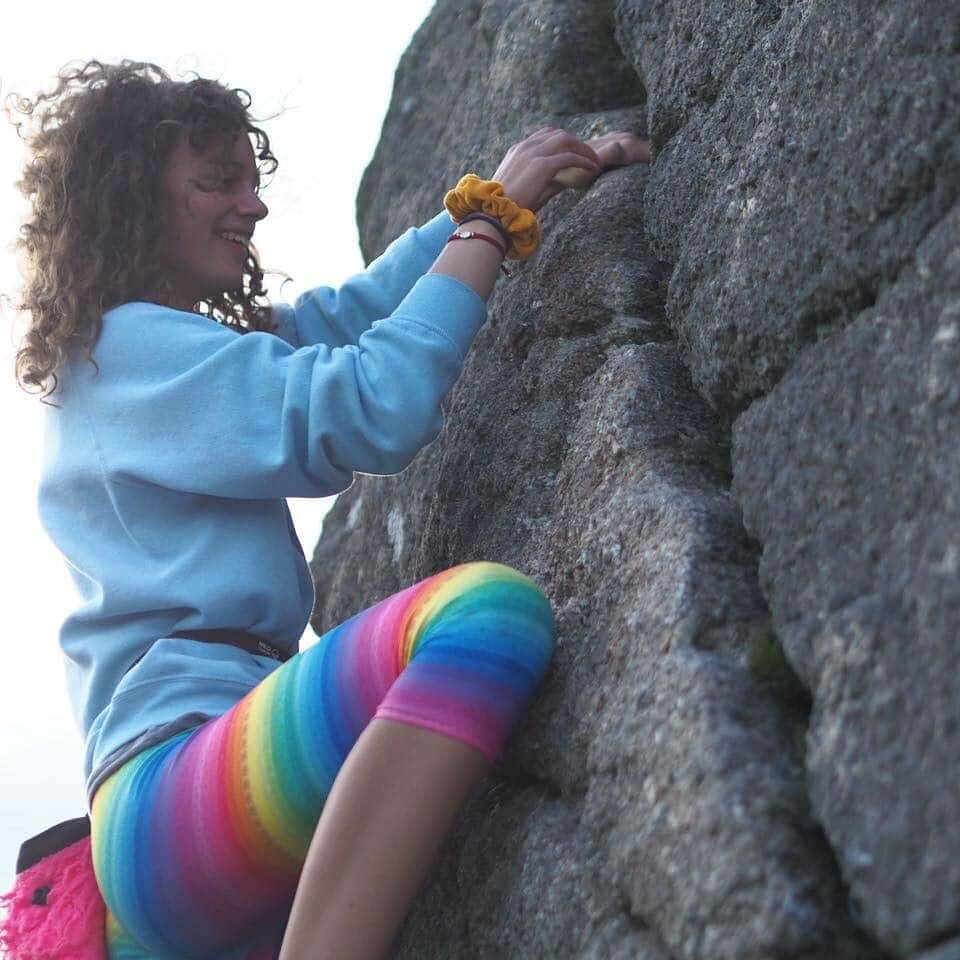Evie Stripp, student
(Photo by Lauren Sawyer)
“Climbing provided an escape, the focus and determination pushed other problems away”
I usually manage my mental health by changing location. I will stay in a place for as long as I can deal with, and then I’ll need to make a change.
It gives me something to look forward to. One sneaky suicidal thought or bad memory or urge to check something and I “flee the scene”. I learnt this in CBT (cognitive behavioural therapy) the year before last, but I have been doing this to a lesser extent for a very long time now.
Before lockdown, the place that I most liked to escape to was the local climbing wall. I am an open university student and it didn’t matter that I didn’t always have time to climb for very long and that I could read and study at home. Home lacks distraction from the memories and the pain. The hot chocolate isn’t as good at the wall, but it is served with a smile and small talk.
On bad mornings I would arrive at opening and stay all day (ten hours) yo-yoing between studying or resting in the café and climbing. The café was comforting, its background noise offered companionship and I would see and chat to many familiar faces. Climbing provided an entirely new escape, the focus and determination required pushed all other problems away. When I achieved, I felt ecstatic and when I failed it was still easier to handle than my other problems.
So, when lockdown started and the wall closed, I was completely lost. At the time, I was trying to deal with several other recent triggers on top of my usual ones and my main and most practised coping mechanism was suddenly illegal. That was incredibly hard.
I stopped sleeping until the very early hours. I avoided studying. I was angry towards my family. I was sad and weepy, and I spent a lot of time staring at nothing. My mind revisited very unpleasant memories from a traumatic experience I had in my mid-teens. During the first two weeks of lockdown I wanted to die.
I survived the next twelve weeks though. Social media said to reach out to people, so I checked in on people, even some that were only acquaintances. I tried to keep the conversation positive because I found that if I couldn’t deal with me, neither could they. Reaching out to people gave me a purpose and I felt less alone.
I also called the TALKWORKS service, which I have used twice before. I have been placed on a waiting list. Not ideal, but the idea that there is a timeline to help has meant that my suicidal thoughts are less powerful. There is something to “look forward” to.
Most importantly, I adapted “changing location”. I read a lot more because books can guide your thoughts to other places and reading feels more productive than Netflix. I listen to music to set and change the mood and thus the “location”. I wander my “doorstep area” in all weathers for my daily exercise.
With the slow increases in freedom, I have started driving locally. I walk on Dartmoor and along the coast, read with a view and scout bouldering. Driving itself also allows a mental change of location because of the immense concentration required. These methods have all helped immensely but I still miss the climbing wall’s community and long opening hours.
Three weeks ago I found an unlikely alternative: the crematorium. It is open all the time and, though its community is dead, I don’t feel that I am alone when I am there. I can now voice my pain with the illusion that someone is listening and, with the local café open for takeaway, I can bring decent hot chocolate.
My message to anybody who has also found the last few months to be their personal version of hell, is to be creative with changing location. If you can’t go out, try reading or an equally diverting activity. If you can, do so, but stay alert and safe. You have some say in your ‘new normal’.
Evie climbing with her brother Tim (photo by Lauren Sawyer)


